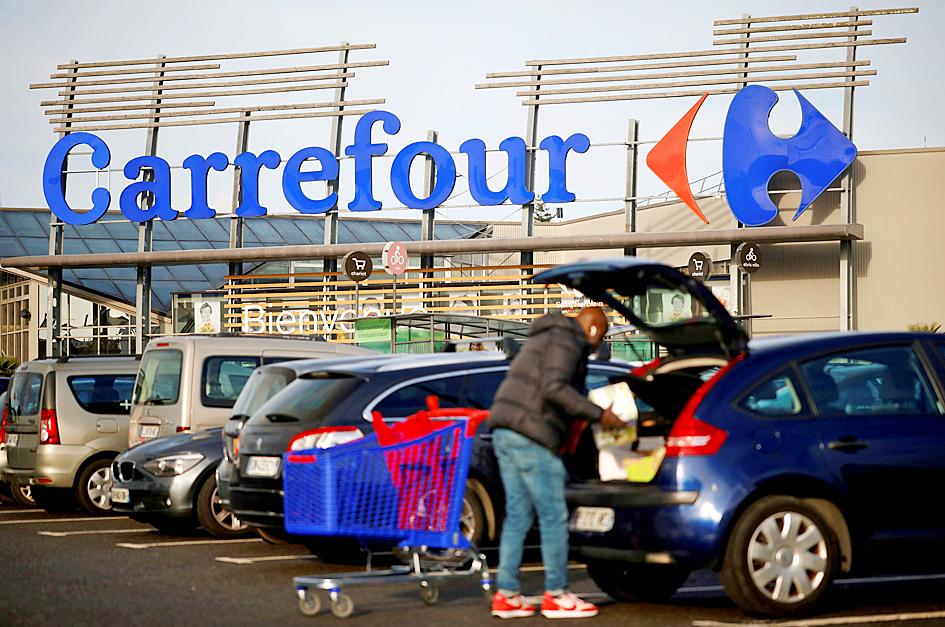Uber Technologies Inc is expanding its partnership with French grocery chain Carrefour SA to offer rapid delivery of groceries from nine micro-fulfillment centers across Paris.
Surging consumer demand for online ordering is driving San Francisco-based Uber to expand its local grocery offerings in Europe and the deal with Carrefour could be a prelude to a broader rollout of such services in other European markets.
While Uber customers were already able to receive items from Carrefour in 30 minutes, the new service is to allow consumers to get deliveries from so-called “dark store” locations operated by Carrefour-backed start-up Cajoo within 15 minutes, the firms said in a statement.

Photo: Reuters
“The opportunity is massive,” said Eve Henrikson, Uber’s regional general manager for delivery in Europe, the Middle East and Africa.
“I think the question is: How can you win in the sense of providing the best possible customer proposition with the best possible operating model?” Henrikson said.
Earlier this year, Uber hired Henrikson from her role as online director at Tesco PLC, as the ride-hailing company’s grocery orders surged 620 percent in Europe, the Middle East and Africa (EMEA) region last month from a year earlier.
There were more than 9,000 grocery stores on the Uber Eats app across EMEA last month, a 400 percent increase from the same time last year.
“I could see a number of countries for partnerships like this,” Henrikson said in an interview. “The UK is one of them, but I could see this model working in multiple markets in EMEA for us.”
The new service, called Carrefour Sprint, is to allow people in Paris to order from a selection of about 2,000 items such as produce and cleaning products.
Uber and Carrefour plan to expand the offering to other major French cities in the next few weeks.
Previously, Uber has worked on rapid delivery in the US in partnership with fast-growing start-up Gopuff.
Interest from industry heavyweight Uber adds to the growing rush into the sector from publicly listed delivery companies, with US leader DoorDash Inc and Germany’s Delivery Hero SE both investing in rapid grocery apps Flink SE and Gorillas Technologies GmbH respectively.

CAUTIOUS RECOVERY: While the manufacturing sector returned to growth amid the US-China trade truce, firms remain wary as uncertainty clouds the outlook, the CIER said The local manufacturing sector returned to expansion last month, as the official purchasing managers’ index (PMI) rose 2.1 points to 51.0, driven by a temporary easing in US-China trade tensions, the Chung-Hua Institution for Economic Research (CIER, 中華經濟研究院) said yesterday. The PMI gauges the health of the manufacturing industry, with readings above 50 indicating expansion and those below 50 signaling contraction. “Firms are not as pessimistic as they were in April, but they remain far from optimistic,” CIER president Lien Hsien-ming (連賢明) said at a news conference. The full impact of US tariff decisions is unlikely to become clear until later this month

With an approval rating of just two percent, Peruvian President Dina Boluarte might be the world’s most unpopular leader, according to pollsters. Protests greeted her rise to power 29 months ago, and have marked her entire term — joined by assorted scandals, investigations, controversies and a surge in gang violence. The 63-year-old is the target of a dozen probes, including for her alleged failure to declare gifts of luxury jewels and watches, a scandal inevitably dubbed “Rolexgate.” She is also under the microscope for a two-week undeclared absence for nose surgery — which she insists was medical, not cosmetic — and is

GROWING CONCERN: Some senior Trump administration officials opposed the UAE expansion over fears that another TSMC project could jeopardize its US investment Taiwan Semiconductor Manufacturing Co (TSMC, 台積電) is evaluating building an advanced production facility in the United Arab Emirates (UAE) and has discussed the possibility with officials in US President Donald Trump’s administration, people familiar with the matter said, in a potentially major bet on the Middle East that would only come to fruition with Washington’s approval. The company has had multiple meetings in the past few months with US Special Envoy to the Middle East Steve Witkoff and officials from MGX, an influential investment vehicle overseen by the UAE president’s brother, the people said. The conversations are a continuation of talks that

Alchip Technologies Ltd (世芯), an application-specific integrated circuit (ASIC) designer specializing in artificial-intelligence (AI) chips, yesterday said that small-volume production of 3-nanometer (nm) chips for a key customer is on track to start by the end of this year, dismissing speculation about delays in producing advanced chips. As Alchip is transitioning from 7-nanometer and 5-nanometer process technology to 3 nanometers, investors and shareholders have been closely monitoring whether the company is navigating through such transition smoothly. “We are proceeding well in [building] this generation [of chips]. It appears to me that no revision will be required. We have achieved success in designing